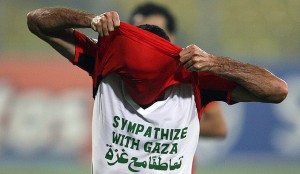“It is unacceptable that children are killed while they play football.” So declares a statement by 62 professional footballers protesting the recent Israeli actions in Gaza. Posted on the website of Frédéric Kanouté, it includes some of the best known names in global football, notably Didier Drogba and Eden Hazard. It is a striking gesture, one with few precedents. It highlights how powerfully football and politics are increasingly intertwined in Israel and Palestine.
The statement expresses “solidarity” with the people of Gaza, and specifically mentions the bombing of a football stadium that resulted in the deaths of four teenage boys. (The Israel Defense Forces claimed the soccer stadium was being used as weapons depot and launching site by Hamas). The footballer’s petition also mentions the arrest of two professional Palestinian footballers. And it insists that it would be immoral, in this context, for Israel to host the upcoming UEFA U-21 Championship. Having this event in Israel, the statement argues, would be a violation of “sporting values.”
There have been such protests before by footballers. The Egyptian international Mohamed Aboutrika famously bared a shirt saying “Sympathize With Gaza” during the African Cup of Nations in Ghana in 2008 (below), and Kanoute had similarly shown a shirt that read “Palestina” after scoring a goal for Seville in 2009.
Still, the new petition represents a more sustained action that draws together a powerful group of players. The size of the petition suggests interestingly some of the ways in which the exchanges and connections built within locker-rooms and on the pitch can become the basis for political mobilization.
This action followed the precedent set by the African Football Confederation, which had expelled South Africa in 1958. The African nations were ultimately successful in pressuring FIFA to refuse South African membership, and the country was unable to compete in international competition until it fielded a multi-racial team in the early 1990s.
The situation with Israel was different, since FIFA did not officially outlaw the Israel Football Federation, which occasionally participated in competitions, despite the fact that it did not have a Confederation to play in. By the early 1990s, the IFA petitioned successfully to join UEFA, gaining full membership in 1994. That inclusion is, of course, weighted with symbolism: like Turkey, Israel competes in UEFA competitions such as the European Cup, while the countries that surround it continue to compete in the Asian Football Confederation.
And what of that other Football Federation — that of Palestine? Though it too traces its genealogy back to the 1928 Palestine Football Association. But it was only in 1998, with the creation of the Palestinian National Authority, that a separate Palestinian Football Association was founded. Accepted by both FIFA and the Asian Football Confederation, Palestine has fielded national teams in the years since then.
The story of the team’s campaign to qualify for the 2006 World Cup is documented in a film called Goal Dreams. That team, bankrolled by local businessmen, was about as cosmopolitan as it gets, bringing together local players from the West Bank and Gaza with Palestinians in Chile and one university player from the U.S. Descendants of Palestinian immigrants, they believed in the mission of the team. But on the pitch, their playing styles clashed, and they didn’t even have a common language to speak. Their practices were at times rendered impossible as certain players were unable to get in and out of the West Bank. In telling this story, Goal Dreams serves as a kind of anti-sports film: as it begins, you think it might be the story of triumph over adversity and the capacity of sport to unify and heal. Instead, it’s a case study in how limited means, political pressure, and the lack of a sustainable athletic program can fritter away dreams of athletic glory.
Many, including Michel Platini, have over the years dreamed that football can help bring peace and understanding to the region. In 2011 a new stadium was opened for the Palestinian Federation, funded by several European countries and FIFA. Lilian Thuram went on a goodwill tour to the region and attended the opening of the stadium. And yet the day when we will see a goodwill Palestine vs. Israel match seems quite far off.
The situation in Palestine today interestingly parallels that in Catalonia where, as Sid Lowe recounts in an excellent recent video aspirations for autonomy have long found a powerful expression on the football pitch. As demands for autonomy increase there, football continues to play a critical political role. In addition to it’s de facto “national” team, Barcelona, Catalonia also has it’s own “national” team made up of volunteers, who have in the past made a good showing on the pitch.
But Palestine, of course, is not Catalonia. That two Football Federations, and indeed two Football Confederations, co-exist so uneasily within a tiny part of the world is just one symptom of the endless, churning, complications of the story of Israel and Palestine.
The prior examples of Algeria and South Africa — and more recently events in Egypt — teach us that football can at times play a critical role in broader political change. But it’s difficult to predict how this will play out in the case of Palestine. Will the petition of the 62 footballers end up being part of some kind of shift in the political debate? How will UEFA respond in some way to the demand posed by these footballers? In the end, the petition is likely to end up little more than a footnote in a larger, tortuous history. But if it helps establish the idea that footballers can and should speak their minds on political issues, it may be part of a meaningful shift in the way athletes think about their political selves, and their political roles, in the roiling conflicts to come.


Pingback: GoalBite.com
Thanks for this! Wonderful stuff.